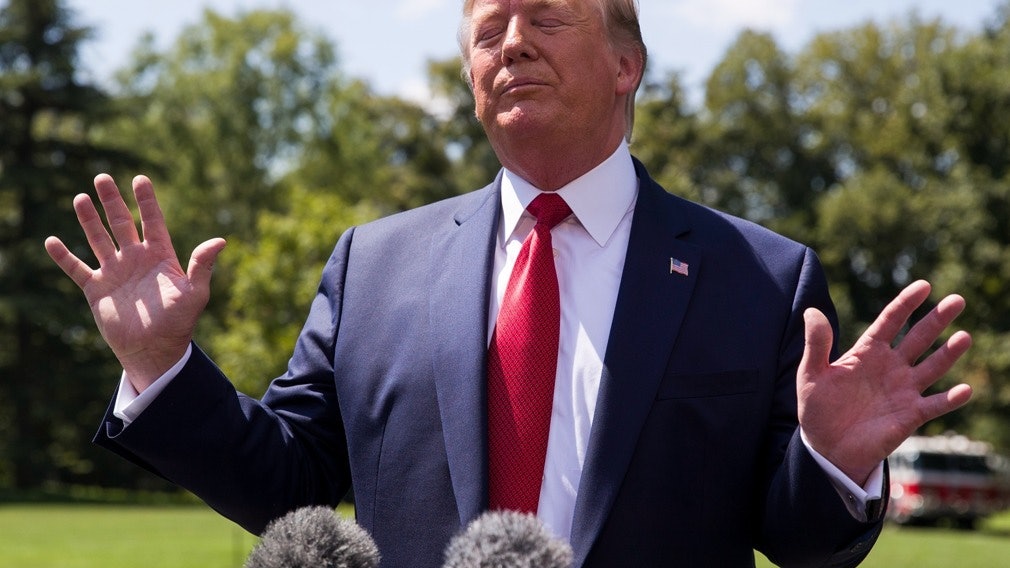From August 21st to 22nd, US President Donald Trump made a statement for two consecutive days, changing the tone of China-US trade war and Hong Kong protests. This shift has also greatly undermined US Vice President Mike Pence and the trade team’s hawkish slogan about the trade war with China.
On August 21, before Trump went to Kentucky to speak for veterans, he continued his previous remarks at the White House. This trade war is not his trade war. The predecessors should have launched this trade war. I am only “the person chosen by God” and confront China. The United States is victorious in the trade war. On August 22, Trump publicly acknowledged that the China-US trade war may hurt the US economy, but he stressed that he is more concerned about the long-term interests of the United States than the short-term losses, and the US economy will not fall into the trap of trade. decline.
Trump’s statement is clearly different from the White House trade adviser Peter Navarro’s statement on August 18. Navarro stressed in an interview on the 18th that although researchers from Harvard University, the University of Chicago and the International Monetary Fund (IMF) expressed concern about the US economy, China’s counter-trade tariffs will not harm any US. people.
In these two days of statements, Trump suddenly focused on long-term interests, rather than short-term economic damage, obviously also an election selling point, focusing on the need to re-elect. In other words, only by re-electing in 2020 can we completely win this trade war and the interests of the United States can be guaranteed. This is entirely a slight adjustment of Trump’s campaign strategy.
In addition, on August 21, when he left the White House, Trump mentioned to the conservative political news network “Daily Signal” that he would not regard Hong Kong as a bargaining chip in trade negotiations. He hopes that Hong Kong’s problems will be able to He was resolved humanely. He also believed that Chinese President Xi Jinping had the ability to ensure a “humanitarian solution.” This is completely different from the statement made by US Vice President Burns on August 19 linking trade negotiations to the Hong Kong issue.
In late July, when Trump first stated his position in Hong Kong, he mentioned that Hong Kong is China’s internal affairs. In early August, Trump called the Hong Kong protests “Riot” to reporters, causing dissatisfaction between the two parties in the country. On August 15, under the pressure of domestic public opinion, Trump issued a tweet, announcing that the plan to increase taxes on Chinese goods in September was postponed until December, and mentioned that “China wants agreements, first let them be humane.” Handling Hong Kong issues.”
On August 18th, Trump again called on China to “humanely” resolve the situation in Hong Kong, saying that it was “very favorable” to the trade agreement he was seeking. On the 19th, Burns said that if Beijing does not comply with relevant commitments and violence in Hong Kong, it will be “more difficult” for China to reach a trade agreement with the United States.
Accurately speaking, Trump did not tie Hong Kong and trade negotiations from beginning to end. Instead, Pengs deliberately linked the so-called Hong Kong democracy and freedom to China-US relations. Trump even felt “inexplicable” about the Chinese government accusing the United States of interfering in Hong Kong affairs. The existence of this misunderstanding means that Trump himself does not care about Hong Kong’s issues at all.
The change in Trump’s tone is now mainly related to the economic performance of the United States. Trump has been looking forward to the impact of the Fed’s interest rate cuts on the trade war. On August 21st, the Fed reaffirmed that it will maintain interest rate flexibility in the face of global economic uncertainty and will not set a predetermined route for interest rates. This means that the Fed is unlikely to succumb to Trump’s political pressure.
On the same day, the US Congressional Budget Office (CBO) issued a warning on the consequences of the trade war on August 21. The office pointed out that Trump’s tariff policy is expected to reduce US gross domestic product (GDP) by 2020. If further tariff increases may stifle US economic growth, the US deficit growth in the next 10 years may also exceed expectations. .
This reflects Trump’s concerns about the re-election campaign in 2020. From the point of ignoring the pressure from parliamentarians and refusing to use Hong Kong as a bargaining chip, Trump does not want to complicate the next trade negotiations. From his long-term economic interests to explain the short-term economic losses caused by the trade war, it can also be seen that he does not want the trade war to affect his prospects for re-election.
Therefore, regardless of the hawkish aides behind him and the extremely conservative forces behind him, how to help him find extra chips, Trump always insisted on the established route of “talking to talk” and did not give up the original intention of reaching an agreement with China as soon as possible.












